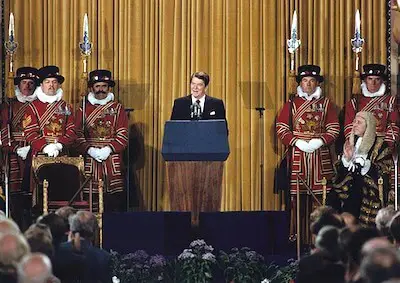A short and easily remembered line, intended by the speaker to be suitable for media repetition.
Sound bite
What's the meaning of the phrase 'Sound bite'?
What's the origin of the phrase 'Sound bite'?
This originated in US media circles in the 1980s. The first known printed citations come from that period; for example, The Washington Post, June 1980:
“Remember that any editor watching needs a concise, 30-second sound bite. Anything more than that, you’re losing them.”
Time, June 1983:
“TV’s formula these days is perhaps 100 words from the reporter, and a ‘sound bite’ of 15 or 20 words from the speaker.”
Those examples make the meaning of the term unambiguous.
Ronald Reagan, who won the nomination as Republican candidate for US President in 1980, was adapt at coining these media-friendly, ‘direct to the people’ phrases; for example:
“Mr. Gorbachev, tear down this wall.” (In a speech near the Berlin Wall, 1987.)
“Win one for the Gipper” (Gipper was Reagan’s nickname.)
The success of Reagan and others in obtaining valuable exposure by providing the media with what it wanted led to a flurry or marketing and speech writing activity. It soon became the vogue to stage events specifically for the opportunity to provide quotable lines for media exposure, often timing them to be picked up by popular TV news programmes. This continued with later US elections – The Independent, September 1988:
“This has been the election of the ‘sound-bite’… Through a crafty choice of venues and irresistible one-liners, George Bush has been relentlessly associated on the television news with simple, feel-good themes.”
By the mid-1980s we had a new breed – the spin doctors. Their influence is such that the use of sound bites is now [2006] commonplace throughout those parts of the world that are strongly influenced by the media, that is, pretty much everywhere.
Although ‘sound bite’ refers specifically to sound and suggests quotations suitable for radio or newspapers, the technique was commonly used in TV news clips. To make this explicit the term ‘sight bite’ was coined to refer directly to video footage. Here’s an early example of that from The Los Angeles Times August 1988
“The pacing, the writing, the sound bites and sight bites and just about everything else that executive producer Lorne Michaels … brought to this usually thudding evening seemed to work.”
‘Sight bite’ hasn’t caught on and probably won’t last the pace.
See other phrases that were coined in the USA.
The history of “Sound bite” in printed materials
Trend of sound bite in printed material over time
Related phrases and meanings
Browse more Phrases
About the Author

Phrases & Meanings
A-Z
A B C D E F G H I J K L M N O P Q R S T UV W XYZ
Categories
American Animals Australian Bible Body Colour Conflict Death Devil Dogs Emotions Euphemism Family Fashion Food French Horses ‘Jack’ Luck Money Military Music Names Nature Nautical Numbers Politics Religion Shakespeare Stupidity Entertainment Weather Women Work
How did we do?
Have you spotted something that needs updated on this page? We review all feedback we receive to ensure that we provide the most accurate and up to date information on phrases.
